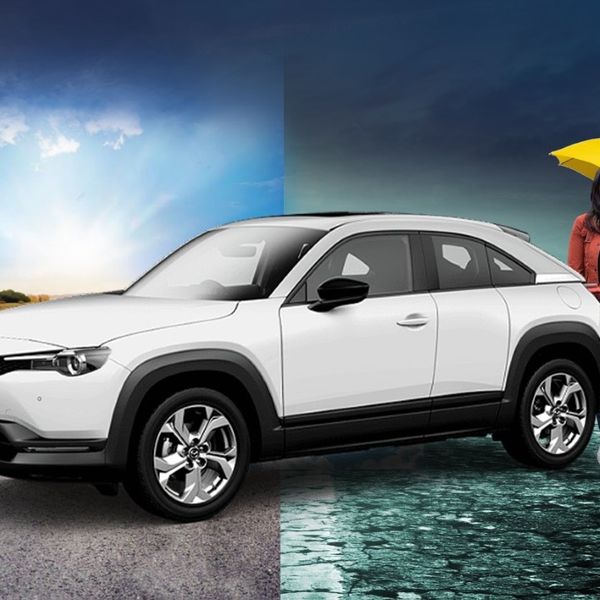By far the biggest environmental cost of a car isn’t the fuel it burns or the electricity it consumes over its lifetime, but the very fact that it exists. In terms of environmental impact, making a car - of any type - is much more harmful than keeping it fed with whatever fuel it needs. It’s also not just the raw materials used in the initial processes, either - it’s how you absorb them back into the system, so you need to consider the whole lifecycle of a vehicle, birth to death and everything in-between. The maths ends up being pretty simple: the more sustainably you can produce a vehicle at the beginning of its life and the more recyclability you build in at the other end, the better.
And there’s now a whole raft of new technologies being built into the production of a car to help mitigate that big upfront environmental cost. So what have we got?
Well, the numbers sound like we’re doing ok - but they tend to be spun by manufacturers to sound good. In Europe, over 90 per cent of the mass of materials recovered from end-of-life vehicles is recycled. It’s not quite that simple, mind - because the recycled stuff usually isn’t quite as high quality as the new gear, but it’s a start.
Some of the new tech sounds really promising. Everything from finding out that any Honda should be up to 90-percent recyclable, so your new Honda is actually made up of the recycled metal and plastic that made up your old one. The new Fiat 500 has floor mats made from recycled fibres, and seats made from Seaqual, a ‘100% post-consumer recycled polyester yarn containing upcycled marine plastic’ recovered from the ocean. Its similar to other kinds of recycled polyester - if you ever see the ‘R-PET’ sign on a fabric, it means that its made from regenerated polyester fibre made from recycled plastic bottles. That’s a good thing.
Here are the answers for the bloke down the pub who says electric cars aren’t green
![Seaqual upholstery in fiat 500]() Whoever came up with the Seaqual name will be feeling rightly smug
Whoever came up with the Seaqual name will be feeling rightly smug Toyota does amazing things with plant-derived plastics used for everything from seating to interior panels, meaning that they don’t use the petroleum usually associated with plastic production. One of our old EV favourites the Nissan Leaf uses old plastic bottles to make up recycled resins used for pretty much everything from seat coverings to dash parts, and there are more innovations on the way.
Wood trims are now likely sustainably sourced too: you’ll see a lot more fast-growing and sustainable bamboo in the options list these days. In fact, the cork trim in the Mazda Mx30 is entirely sustainable, being harvested from a living tree that doesn’t actually need to be chopped down to access the material.
![Mazda CX30 interior centre console]() Mazda's cork is a show stopper
Mazda's cork is a show stopper Of course, if you’re buying an electric car, you’ll likely have half an eye on the environment as well as the practical benefits, and something like a BMW i3 has been ahead of the game for some time. In fact, the i3 is often touted as having a ‘recycled’ interior, and it does pretty well: the dash and door panels are made from renewable natural fibres, and the naturally tanned leather and eucalyptus wood trim are sourced from properly-certified forestry. Fabrics are the 100-percent recycled polyester previously mentioned - though you’d never know it. In fact, the i3 manages around a quarter of it’s interior make-up from renewable raw materials and second-life plastics, and the same amount of up-cycled bits on the outside. That’s pretty good.
But they are just some of the more obvious ones. Many manufacturers derive use from fast-growing hemp products - stuff like sound insulation, door cards and parcel shelves - and Porsche is actually developed a replacement material for carbon fibre made from Flax. It’s almost as strong and light as the fancy carbon, but not quite (at the moment it can’t be used for structural parts, but can be used for wings and door skins and the like), but the real advantage so far is that Porsche reckons it takes 75% less energy to produce a part from natural fibre than it does carbonfibre, and it’s easier to recycle afterwards. Tesla, BMW, Mercedes. Polestar and Lexus all offer leather alternatives, and all are aware that sustainable production benefits both their bottom line and the planet.
![Tesla Model Y interior front]() Tesla's seats are cow-friendly
Tesla's seats are cow-friendly Not only that, but manufacturers are working on making their actual production facilities more efficient and less wasteful. You might not associate it with being the most environmentally conscious manufacturer on the planet - given the cars that it produces - but Bentley’s Crewe campus has been certified as being completely carbon-neutral, with one hundred percent of its electricity coming from either on-site solar or renewable suppliers, and the factory has 10,000 solar panels - that’s about 7.7 Megawatts- worth - enough to provide energy for 1,750 houses.
The Realcar project - a partnership between Jaguar Land Rover (JLR) and aluminium producer Novelis - managed to claw back 30,000 tonnes of press-shop aluminium in one year to throw back into the production of new bits, and the company has been using recycled fabrics and new eco-friendly materials for a while now. Volkswagen reckons that the ID3’s production is carbon neutral, having looked at the four stages of production from supply chain (getting the basic elements), production (making it), use-phase (driving the car) and recycling (second life or pulling it apart to use bits again). The way the company deal with the issues that arise are multifarious, from trying to use renewable energy to power production sites to offsetting any excess through climate protection projects.
It’s not perfect, by any means. Cars are by their very nature not the most efficient of things, and the only way we’ll really mitigate their impact is by not using them. But methods and attitudes are changing, and we should encourage the take up. But my favourite car-based recycling fact? The most-recycled material in the world of cars is actually the literal roadway. The Federal Highway Administration reckons that asphalt is the World’s most recycled product - about 80-percent of which is dug up and re-used in other projects. So if cars can manage to be as recycled as the roads they drive on, we’d all be in a much better, greener place.
![VW ID.3 first edition driving in country]() ID.3 is carbon neutral to produce
ID.3 is carbon neutral to produce  Whoever came up with the Seaqual name will be feeling rightly smug
Whoever came up with the Seaqual name will be feeling rightly smug 













